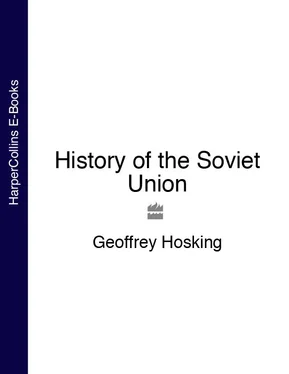This did not make the practical dilemmas of the radicals any easier. It was not at all clear how they were to achieve their aims. Alexander Herzen, perhaps the first thorough-going Russian socialist, thought the peasant commune should function as the nucleus of the new society, but he was ambivalent about how and even whether a revolution should take place to bring that about. Mikhail Bakunin urged that the only essential thing was to spark off a massive popular uprising by the narod (the common people), and this would of itself purge and destroy the evils of existing society, leaving men free to improvise. Petr Lavrov, on the contrary, hoped that revolution would not be necessary at all: he felt that the educated strata had a debt to the narod, their education having been made possible by the latter’s toil. They should pay this debt off by ‘going to the people’ and passing on the fruits of their education to them, teaching them how they might create a truly humane society on the basis of their own institutions, the mir and the artel. In the 1870s several hundred students tried to fulfil Lavrov’s vision, learning handcrafts and dressing in smocks and felt boots in order to live in the village, practise a trade and pass on the good word. Most, though not all, of the peasants met them with incomprehension and some suspicion: for the time being at least their faith in the ‘little father’ tsar was still unshaken. Many of the student idealists who ‘went to the people’ finished up in prison.
Their failure lent strength to those who argued that a revolutionary movement must lead and it must use violence, disorganizing the government apparatus by terror, and if possible seizing power by a coup d’état. An organization called the People’s Will ( Narodnaya volya ) was set up to achieve this, and in 1881 it actually succeeded in assassinating the Emperor Alexander II. But setting up a different regime, or even putting effective pressure on Alexander’s successor–that proved beyond their capacities. Their victory was a pyrrhic one: all it produced was more determined repression.
By the 1880s, in fact, the Russian revolutionary movement seemed to be in a blind alley, unable to achieve its aims either by peaceful propaganda or by terrorism. It was in this situation that Marxism presented itself as a panacea in troubled times. Its first Russian exponent, Georgy Plekhanov, was the leader of those who had refused to accept the methods of the People’s Will. He welcomed Marxism because it suggested he had been right all along in rejecting the idea of a coup d’état: no revolution could yet come about in Russia, by any means, simply because objective social and economic circumstances were not yet ripe. Plekhanov’s interpretation thus emphasized Marxism’s determinist features: he argued that capitalism had not yet even begun in Russia, so that naturally the socialist revolution, which could only take place as a result of the contradictions of capitalist society, had no chance of success yet. In his view, Russia must first accept the coming of capitalism, with the concomitant breakdown of the peasant commune and the creation of large-scale industry, because these processes would generate a genuinely revolutionary class, the factory proletariat, which would not let down the hopes of the radical intelligentsia, as the peasantry had done. Plekhanov took up Marxism with such enthusiasm because he discerned in it a scientific explanation of history, and hence the certainty that the revolutionaries, if they followed it, would no longer sacrifice their hopes, and indeed their lives, in vain. Previous revolutionaries he dismissed contemptuously as ‘Populists’.
Historians of Russia often approach Marxism as though it came to the country as a completely formed and internally consistent doctrine. In fact this was far from being the case. Marxism was itself the product of European experiences not unlike those which had troubled the Russian revolutionaries of the 1860s and 1870s, especially the disappointments of the French revolution, and of the European risings of 1848–9. Each time, the shortfall between revolutionary expectation and subsequent reality had been immense. Marx claimed that this was because the revolutionaries had not heeded objective socioeconomic conditions: they were in fact mere ‘utopian socialists’. His kind of socialism, on the contrary, he described as ‘scientific’. He argued that the proletariat, growing now uncontrollably with the expansion of capitalist industry, would overcome the gap between ideal and reality. The factory worker was in a uniquely favourable position to achieve this, since he was both the ‘subject’ and the ‘object’ of history: the object in that he was the victim of its economic laws, the subject in that he was conscious of the fact that he had nothing to lose and he was impelled by the vision of the more just and prosperous society that would come out of his revolt. As the unavoidable contradictions of capitalism bore ever more heavily on the workers, so they would inevitably rise and overthrow their oppressors, creating of their shared destitution a more just and humane society.
In this way Marx overcame, to his own satisfaction and that of most of his followers, the troubling gap between ideal and fulfilment. The trouble is, there was and is no necessary connection between Marx’s vision of intensifying socioeconomic crisis, with everyone moved by their own material interests, and the world of harmony and brother-hood which was supposed to succeed the revolution. Indeed, logically speaking, if the workers were impelled by their own economic interests in making revolution, then the more likely sequel of such a revolution would be further economic struggle, but with a different set of masters. Nevertheless, the idea that the workers’ revolution would somehow magically cancel out all the conflicts of society had enormous attraction. It seemed to be both realistic and optimistic at the same time. It had the simultaneous attractions of a science and a religion. That is what made it so appealing, and nowhere more so than in Russia, where the intelligentsia already had its own troubles with a secular state claiming religious prerogatives.
Certainly the young Vladimir Ulyanov–or Lenin, as he became known–was attracted by precisely this dual nature of Marxism. He had been deeply affected by the execution in 1887 of his elder brother Alexander for membership of a conspiracy to murder the emperor. Lenin was attracted by his brother’s idealism and self-sacrifice, but at the same time he was determined not to give up his own life in vain. He wanted to pursue Alexander’s aim of revolutionary social transformation with certainty . Hence the scientific claims of Marxism were very important to him. Reading Marx’s Capital was, as he later said, a revelation to him, because it seemed to demonstrate that revolution was embedded in the objective evolution of society, if one only had the patience and consistency to await its unfolding. In his own early writings, Lenin made a similar analysis of Russia’s own socioeconomic structure, aiming to show that capitalism was already destroying the economy of the peasant commune, and that capitalism–and therefore ultimately revolution–was inevitable in Russia. Admittedly Lenin felt that Russia had further to go than most of Europe, and, following Plekhanov, he envisaged a revolution in two stages: (i) the ‘bourgeois democratic’ one, when the feudal system, still not entirely destroyed in Russia, would be finally overthrown by an alliance of the ‘bourgeois liberals’ with the as yet small workers’ party; (ii) the later socialist stage, which would come in the fullness of time, when capitalism was fully developed and the working class had reached maturity.
Читать дальше












